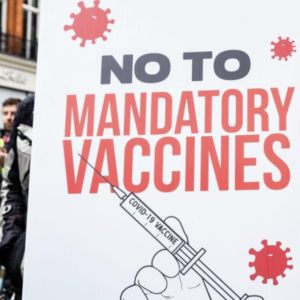Wednesday afternoon, I had the distinct pleasure of stopping by and talking with the employees from GE Hooksett, who were protesting the vaccine mandates ordered last week. Three of the organizers of the protest had contacted me by email when they got the initial directive from GE Corporate, asking for my assistance in any way I could render it. They were afraid of losing their jobs, they were afraid for their families, they felt injustice at the actual missive from GE corporate that had invasive demands they felt trampled on their rights. Their decision to hold a protest came as a very last-minute surprise to me; they came together and organized it only a day before making it a reality.
Unlike some other protests in the news lately, this group of employees was peacefully standing on the roadside with signs, holding American and Gadsden flags, and encouraging the support (by honking) of almost every vehicle that passed the busy main artery through Hooksett. I spoke with nearly everyone there at some point, and heard their stories, their reasons for being involved, and came to know their determination to draw a line against what they see as a violation of their civil rights.
No one present was against the vaccine (some were already vaccinated by choice), and not one person espoused to me any conspiracy theories about what it contained. Rather, every single person was there demanding that the company for which they worked respect their individual right to choose. Every sign said as much.
In the initial emails sent to me (three separate emails sent simultaneously) they questioned the right of their employer, GE, to insist that any religious exemption filed MUST use the form provided by the HR department, which included very invasive questions. It asked them to detail aspects of their religion in order to claim an exemption. Questions which, if an employer asked a prospective new-hire in an interview, would be illegal.
They demanded to know when and where people worshipped; the name and function of their spiritual leader; the philosophy and pretense of their religion. Failure to answer these intrusive details meant automatic denial.
Many asked me, “This is America and I have freedom of religion. Why can my company be allowed to ask me all these details? Religion is a private personal choice guaranteed by our Constitution.” I didn’t have an answer. All I could tell them is that I agreed. This kind of questioning surpassed the legal bounds by which any company can act without being discriminatory, and crossing that line of civil rights abuse.
People in this large gathering, as far as I could tell, didn’t fall into any single category except that they were hard-working Americans who saw a line being crossed that they could not accept. Several told me that they would rather resign, and get another job, than to submit to invasive personal questions about how they worshipped. It is almost guaranteed that of the hundreds who protested throughout the day they all had different religions and beliefs, but they were united in the idea that the privacy of their choice to worship was an unalienable right. One they would not give up, even in the fearful face of unknown employment prospects.
This is America. This human condition and desire to have the freedom of religion without question and critique, is what built our nation. None of us would ask our neighbor to explain their religion, why would we stand by and let corporations decide what religion is acceptable and what religion is not?





